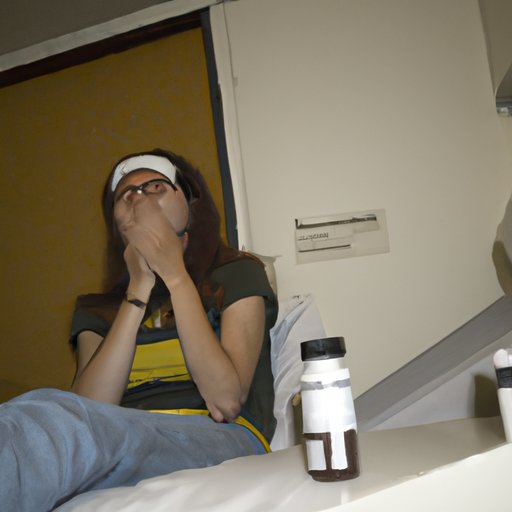
Introduction
Antihistamines are a common medication used to manage allergies, colds, and other conditions. While they are generally safe and effective, there is one side effect that causes concern for many people: sleepiness. In this article, we will explore the science behind antihistamines and sleepiness, discuss different types of antihistamines and their sedative effects, and provide tips for managing sleepiness caused by these medications.
The Science Behind Antihistamines and Sleepiness: A Comprehensive Look
Antihistamines work by blocking histamine, a chemical in the body that is released during an allergic reaction. Histamine is also involved in promoting wakefulness and alertness, so blocking it can have sedative effects.
Antihistamines differ from other sedative medications in that they do not act on specific receptors in the brain associated with sleepiness. Rather, they affect a broader range of receptors, which can lead to drowsiness as a side effect.
Sleepiness and Antihistamines: Understanding the Connection
Sleepiness is a common side effect of antihistamines, affecting up to 50% of users. The likelihood of experiencing sedative effects can vary based on factors such as age, dosage, and other medications being taken.
Some people may be more sensitive to the sedative effects of antihistamines due to individual differences in metabolism or other factors. Additionally, certain types of antihistamines are more likely to cause drowsiness than others.
Do All Antihistamines Make You Sleepy? A Guide to the Different Types
There are two main types of antihistamines: first-generation and second-generation. First-generation antihistamines, such as diphenhydramine (Benadryl) and chlorpheniramine (Chlor-Trimeton), are known for their sedative effects and are more likely to cause sleepiness.
Second-generation antihistamines, such as loratadine (Claritin) and cetirizine (Zyrtec), are newer medications that were designed to minimize sedative effects. While they can still cause drowsiness in some people, they are generally considered less sedating than first-generation antihistamines.
The Pros and Cons of Taking Antihistamines When You Need to Stay Alert
Antihistamines can be effective in managing allergies, colds, and other conditions. However, they can also cause side effects such as sleepiness and impaired performance, which can be problematic in situations where alertness is important (e.g. driving, operating machinery).
It is important to weigh the potential benefits and risks of taking antihistamines in any given situation. If you need to stay alert, it may be best to avoid antihistamines that are known to cause sedation and explore alternative treatments.
Exploring Alternative Solutions to Sleepiness Caused by Antihistamines
If you are experiencing sleepiness as a side effect of antihistamines, there are several strategies you can try to mitigate this effect. Caffeine and exercise can both help promote wakefulness, while getting adequate sleep at night can reduce daytime sleepiness.
For people who are especially sensitive to antihistamines or need to stay alert, there are also alternative treatments for allergies and other conditions that do not cause sedation.
How to Mitigate Antihistamine-Induced Sleepiness While Keeping Your Allergies at Bay
If you decide to continue taking antihistamines despite the risk of sleepiness, there are several steps you can take to minimize this effect. Timing your dose strategically (e.g. taking it at bedtime) can help ensure that you experience drowsiness when it is least disruptive.
Taking a lower dose of antihistamines may also reduce the risk of sleepiness. However, it is important to follow your doctor’s recommendations regarding dosing and timing in order to achieve the maximum benefit without undue risk.
The Impact of Dosage and Timing on Antihistamines’ Sedative Effects: What You Need to Know
The sedative effects of antihistamines are dose-dependent, meaning that higher doses are more likely to cause sleepiness. However, even low doses of certain antihistamines can cause drowsiness in sensitive individuals.
Timing can also play a role in the sedative effects of antihistamines. Taking your medication before bed can help ensure that any sleepiness you experience occurs during a natural period of rest.
Conclusion
Antihistamines can be a highly effective tool for managing allergies and other conditions, but they can also cause sleepiness as a side effect. By understanding the science behind antihistamines and their effect on wakefulness, individuals can better navigate their use of these medications and minimize the risk of sedative effects. Ultimately, it is important to speak with a healthcare provider if you have concerns about your medication and to carefully weigh the potential benefits and risks of any treatment.





